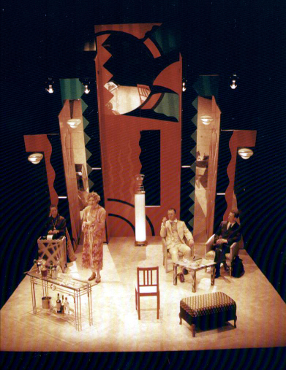Canadian Theatre Encyclopedia
Angel’s Trumpet

One-act play by Sharon Pollock, premiered at Theatre Junction, Calgary, Alberta, February 28, 2001, directed by Sharon Pollock. Set and lighting design by Terry Gunvordahl; sound design by Trevor Leigh.
Sharon Pollock investigates the life of a woman who struggles against a patriarchal regime, and who questions the role in which she has been cast by others, returning to a theme that increasingly preoccupies her works – the personal price exacted by “art.”
Angel’s Trumpet examines the fraught symbiotic relationship between Scott and Zelda Fitzgerald, and its potential for artistic creativity and personal destruction. From Nancy Mitford’s biography, Zelda, (1970), Pollock has taken the outlines of a love/hate relationship of a “beautiful and damned couple.” The title is the name of a poisonous lily which was the subject of one of Zelda’s still life paintings: it may also function as a metaphor of the last judgement, since the play suggests a courtroom drama in which Zelda’s sanity is being assessed by a psychiatrist, with her husband as the prosecutor.
The action takes place in 1933 in the Fitzgerald’s home outside of Baltimore, eleven months after Zelda’s release from a psychiatric clinic, seven months after the publication of her only novel, Save Me the Waltz, nine months prior to her recommitment and the serial publication of Scott Fitzgerald’s Tender is the Night. Fitzgerald’s intention is to gain control of her medical care, and to curtail her artistic ambitions, since he sees them as detrimental to her health, and to his career. In using her own life as raw material for her art, she has been drawing on the same raw material as her husband.
In her programme notes for the Theatre Junction production, Pollock states that what interests her as a playwright and director “is the nature of the ownership of a life and its transformation into a literary (or dramatic) text, and whether one individual’s urge to self-expression can be justifiably sacrificed if it’s deemed necessary for the self-expression of a genius (as some have described Scott Fitzgerald). More importantly [for Pollock] is the question, where does the truth lie? In the living of our lives, or in the multiple ways and means we have of recording them?” Pollock has always been articulate and perceptive about her work in her introductions and interviews. In her comments to the “Calgary Herald” arts critic, she explains that Zelda is an extension of characters in her earlier plays – Walsh and Hopkinson: “Recently it’s been a female character who is unable to conform to what is expected of her or whose sense of herself doesn’t conform to what she’s told she should be.”
Zelda initially remains passive and unresponsive, but finally responds with an impassioned and extended monologue. The couple then takes turns at launching diatribes against each other, recapitulating the past, defending their art, battling for psychic survival and power, and foreshadowing the future and Zelda’s death by fire in a psychiatric institution. Fitzgerald’s accusations and vituperations are witnessed by an ineffectual psychiatrist, whom he attempts to bully and threaten into agreement.
A silent impassive stenographer records every word. Finally she presents the entire record to Zelda, as if to imply that she, after all, should own her own story.
Angel’s Trumpet is published with two other recent plays by Pollock about women - Moving Pictures and End Dream - in Sharon Pollock: Three Plays. Ed. Sherrill Grace. Toronto: Playwrights Canada Press, 2003.
Commentary by Anne Nothof, Athabasca University.
Last updated 2017-07-10

